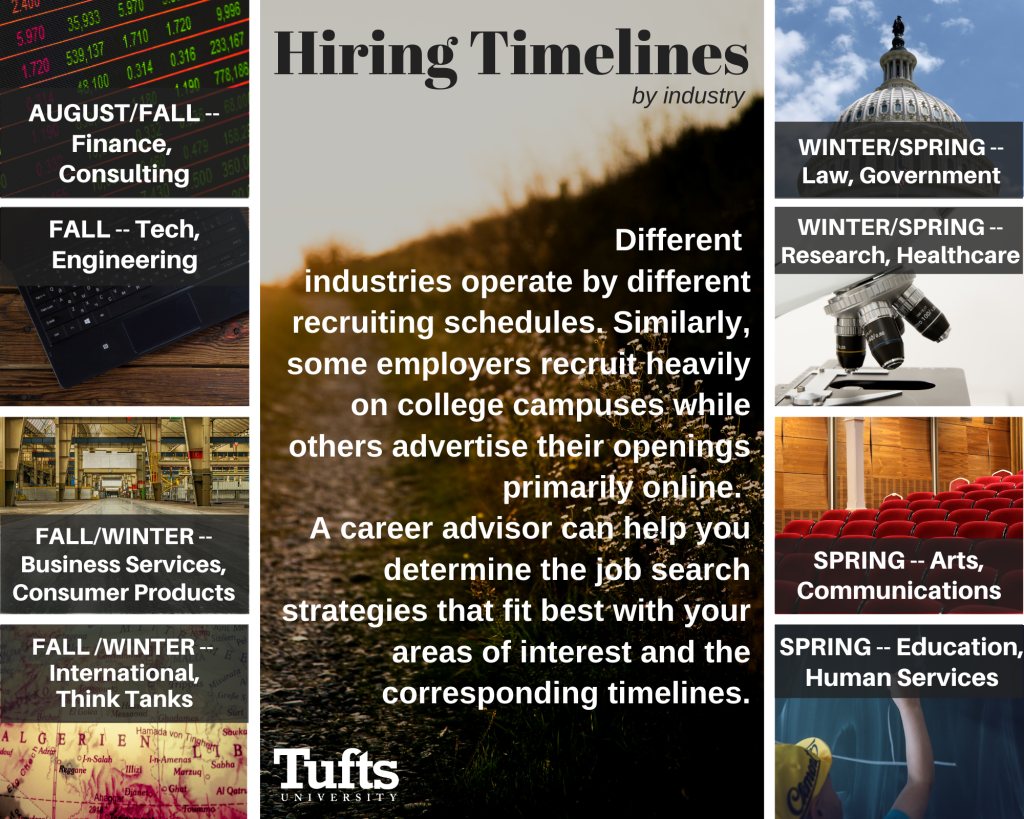Understanding Hiring Timelines
“It seems like my friends are already interviewing for or have secured jobs/internships, and I’m not sure if I’m too late. What should I do?”
Have you ever felt this way? Do you have questions about hiring timelines? If so, here are 5 things to keep in mind:
1. First, remember that this is YOUR process, not someone else’s.
Whether you’re looking for a job, internship, fellowship, or applying to graduate or professional school, your process will be different from those around you. Don’t worry — that’s to be expected! Yes, it can be tough, but try not to compare.
2. It is important to research the hiring timelines for career fields and employers that interest you.
Some organizations recruit early in the fall, while others may not post their jobs/internships until late spring. (See below for a general outline, but remember, there are always exceptions to hiring timelines.) Look at organization websites to get a sense of the deadlines for their jobs and internships.
Current seniors: it can be challenging to ascertain whether a position is meant for YOU, i.e., someone graduating in May, OR if it’s intended for someone who can start sooner, i.e., in less than a month. If possible, you could consider reaching out to the prospective employer to ask if seniors can apply. If you’re unsure, you might still choose to apply and hope they keep your application on file, but understand that they may want someone who is able to start earlier. At the very least, add the organization to your “list of employers to revisit,” because they may post opportunities in the future that better match with your timeline.
3. It’s ALSO important to understand the types of hiring practices.
Many organizations hire on an as-needed basis, which means that they post jobs as they become available (rather than on a set schedule). This is common at smaller organizations across various industries. It can take between 4–12 weeks for a company to post a position, review applications, conduct interviews, and extend an offer.
Large organizations, meanwhile, are better able to predict their hiring needs in advance. For full-time, entry-level positions, their recruiting follows a more predictable pattern during candidate’s final year. This style of recruiting generally implies a specific start date, i.e., a time when the entire group of new hires will start. These kinds of organizations often draw from their intern pool to fill entry-level positions. In addition, some large organizations offer special rotational or leadership development programs. These opportunities are 1-2 years in duration and allow you to train with more than one department, according to a pre-determined timeline.
4. There are always exceptions.
We said it above, but it bears repeating! Sometimes students will say, “Well, I didn’t find an [internship, job] by XYZ date, so it probably means I won’t find anything.” Not true! There are always more places to look, people to talk to, and strategies to try. And talking to people brings us to our final point …
5. Career advisors are here to support you.
Whether you’re reflecting on your skills and competencies, exploring career fields and employers, or searching for jobs/internships (or grad programs!) that match your interests, we can help. It’s never too late to start!
Schedule a Career Advising Appointment



